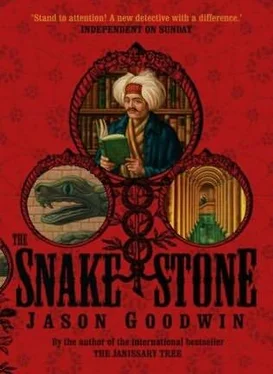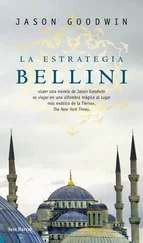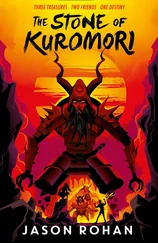Jason Goodwin - The snake stone
Здесь есть возможность читать онлайн «Jason Goodwin - The snake stone» весь текст электронной книги совершенно бесплатно (целиком полную версию без сокращений). В некоторых случаях можно слушать аудио, скачать через торрент в формате fb2 и присутствует краткое содержание. Жанр: Исторический детектив, на английском языке. Описание произведения, (предисловие) а так же отзывы посетителей доступны на портале библиотеки ЛибКат.
- Название:The snake stone
- Автор:
- Жанр:
- Год:неизвестен
- ISBN:нет данных
- Рейтинг книги:4 / 5. Голосов: 1
-
Избранное:Добавить в избранное
- Отзывы:
-
Ваша оценка:
- 80
- 1
- 2
- 3
- 4
- 5
The snake stone: краткое содержание, описание и аннотация
Предлагаем к чтению аннотацию, описание, краткое содержание или предисловие (зависит от того, что написал сам автор книги «The snake stone»). Если вы не нашли необходимую информацию о книге — напишите в комментариях, мы постараемся отыскать её.
The snake stone — читать онлайн бесплатно полную книгу (весь текст) целиком
Ниже представлен текст книги, разбитый по страницам. Система сохранения места последней прочитанной страницы, позволяет с удобством читать онлайн бесплатно книгу «The snake stone», без необходимости каждый раз заново искать на чём Вы остановились. Поставьте закладку, и сможете в любой момент перейти на страницу, на которой закончили чтение.
Интервал:
Закладка:
Istanbul was a city of water, of course: but saltwater. Salt on three sides-and half a million people who needed to wash and drink fresh water every day. Paris had the Seine; London the Thames; half the cities of the Ottoman Empire were watered by the mighty Danube; but Istanbul-however perfect its setting-had only the Sweet Waters. A pretty name for the measly springs that bubbled up at the head of the Golden Horn. Water for a village.
Pipes and channels, siphons and aqueducts: for fifteen hundred years the city had leached its water from the eastern hills, where streams ran through the stands of oak and beech in the Belgrade Forest. Istanbul itself was a city of trees, of course. The old Janissary Tree that stood at its center, in the Hippodrome, was like a sturdy root from which the others sprang: the cypresses and the planes, even the great gnarled oak, which sprawled out over the water at Galata. But the Belgrade Forest was a wilderness.
It had been twenty years since Yashim had gone up there-he was surprised it had been so long. In the time of Grigor and his barbs, when he struggled to stay sane because he was not whole, he would sometimes take a cart ride to the hills and walk all day under the shade of the trees. Odd people lived there, he remembered: the scent in the kebab shop reminded him of the charcoal burners with their conical huts, and of gypsies with sunburned faces, men who talked cheerfully in impenetrable languages. There were descendants of the Serbs who Mehmed the Conqueror had settled in the hills, and who gave the woods a name. The watermen would have been there, too, though he had never seen them: only the lovely reservoirs they tended, where the water slid out in thin sheets across marble slabs, and frogs had mocked him, coupling incessantly among the reeds.
Yashim knew that Istanbul drew its water from the forest, but he had only a vague idea how the water arrived at his standpipe in the yard. Heirs to the traditions of the Roman Empire, whose aqueducts they copied and repaired, the Albanian watermen practiced an art so vital and arcane that its secrets were handed down from father to son. And the thousands who drank and washed and cooked and refreshed their tired eyes and ears in the music of the fountains thought no more about it than about the dogs, or the gulls, or the paving underfoot.
That, then, was the secret that Xani had offered to learn. Six hundred piastres, Yashim thought: it was not, after all, so very much.
He rubbed his hands with a wedge of lemon and dipped his fingers in the bowl.
Murad Eslek had not yet appeared. It was a just matter of time, Yashim decided happily, as he touched the napkin to his lips.
52
Just yards from the Balat landing stage the alleyways closed in. Yashim was funneled between old houses rotten at their bases, green with mildew, stepping past mounds of rubbish that spilled out into the passageway, negotiating stones and holes and ducking the laundry strung at head height. The lanes of Balat were all but impassable in winter; at the height of summer some were wet and squelchy underfoot, the mud green with algae, the stench of rot sweet and pervasive. A few children, whose shaven heads exposed the red sores of ringworm, tagged him up the alleyways. Women with loose turbans covering their hair and their ears watched him from the doorways of their houses; the alleys were so narrow he felt his cloak brush against them as he passed. From time to time he stopped to ask the way: a rabbi in a long robe, a clean-shaven young man with a yarmulke, an olive-skinned dandy in tight European trousers who lounged by a recess in the wall.
An elderly man with a thin white beard came carefully down the lane toward Yashim, prodding the ground ahead of him with a stick, and now and then touching the wall for support.
“Excuse me, efendi,” Yashim said. “I am looking for Baradossa.”
The old man touched the wall with his knuckles.
“You need money?”
“I’m paying a debt.”
The old man turned his head away, spat, and put out his stick.
“Do you know where I can find him?”
The old man mumbled a few words and began to walk away. Yashim felt his fingers tense and flex.
When the old man had gone, Yashim retraced his steps. Balat was still a maze to him, he who had walked over most of Istanbul in his time, but once he found his way to wider streets he remembered how to find Rebecca’s store.
Rebecca gave him an ironical smile when he stamped into her shop, setting the bell ringing.
“Yashim efendi!”
She was taller than Yashim, with a heap of red hair, dark freckles, elegantly plucked eyebrows, and astonishingly fine lips.
“I’m lost,” said Yashim brusquely. “Lost and unwanted. Help me, Rebecca.”
Rebecca laughed. She had three gold teeth. “You look hot and cross. Let’s have some ayran.”
She brushed past him in two strides and stuck her head out of the door. Yashim heard her give a piercing whistle.
Rebecca put her hands on her hips.
“So, you’ve come to our part of the city. You think it’s dirty and the people are unhelpful.”
“I didn’t say-” Yashim began to protest.
“No, but I see it. And it’s good. If you go into a house here, it is spotless. So clean you could eat off the floor.”
“I know that.” Yashim put up a hand. Rebecca folded her arms. A little boy with a shaved head came in with a silver tray.
“We are the same. Not much to look at, eh? If we are rude, it is like the dirt in the street. Your people do not look for gold in dross. Do you understand what I’m saying?”
Yashim nodded and took the glass of ayran.
“That is why we are able to live in peace. Not like those Greeks.” She snorted. “Whatever they have, they like to show it off. If it is jewels or happiness, they wear jewels or go around smiling. If it is sores and afflictions, the long face and the crazy grief. Today they are your best friend, and tomorrow they want to kill you in the street. A Greek, he is like a child. Every day he forgets. A Jew is a man. He is a man who remembers, every day.”
“Remembers what?”
Rebecca gazed at him and shook her head. A lock of her hair swung across her face, and she slipped it back. “Ah,” she said, “that you would never understand.”
Yashim smiled: he knew she was right. Was it Spain, he wondered, whose language they still spoke? That al-Andalus which the Jews-like the Moors-mourned as the Paradise they had lost, treasuring the keys to a vault in Granada, as some old Jewish families did; recalling the pattern of streets and synagogues in Seville? Or was it a promise? Spain was a long time ago. And it must have been many centuries since the Jews had received a sign.
He drained his glass and placed it carefully on the counter. “If your memory is so good,” he said drily, “perhaps you can tell me where a moneylender called Baradossa lives.”
Rebecca pursed her lips. “You’re a glutton for punishment,” she said.
53
Yashim picked his way through the rubbish that had gathered in the courtyard; three tiers of wooden galleries sagged overhead, blocking out the light. The chill air smelled fetid. Yashim knocked several times before a cracked voice demanded his business. He put his lips close to the door.
“I want to talk about a debt.”
“Talk, talk. What is talk?” There was a long silence, then a click. A small hatch in the door opened, and an eye appeared. “Do I know you?”
“I’m here for Xani. The Albanian. Six hundred piastres.”
“When?”
“About six months ago.”
The hatch slid shut again. Inside, he could hear Baradossa muttering to himself.
The eye reappeared. “Who’s that with you?”
Yashim glanced around. The courtyard was empty.
Читать дальшеИнтервал:
Закладка:
Похожие книги на «The snake stone»
Представляем Вашему вниманию похожие книги на «The snake stone» списком для выбора. Мы отобрали схожую по названию и смыслу литературу в надежде предоставить читателям больше вариантов отыскать новые, интересные, ещё непрочитанные произведения.
Обсуждение, отзывы о книге «The snake stone» и просто собственные мнения читателей. Оставьте ваши комментарии, напишите, что Вы думаете о произведении, его смысле или главных героях. Укажите что конкретно понравилось, а что нет, и почему Вы так считаете.












